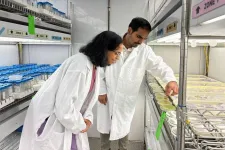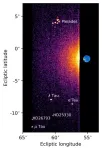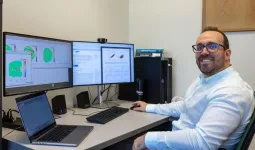(Press-News.org) ST. LOUIS, MO, October 9, 2024 - Plant scientists at the Donald Danforth Plant Science Center and the HudsonAlpha Institute for Biotechnology have been awarded a four-year National Science Foundation (NSF) Enabling Discovery through GEnomics (EDGE) grant to advance their understanding of sphagnum moss, a crucial component of peatlands and a vital player in global ecosystems. The collaborative research team will develop genetic and genomic resources to study sphagnum's life cycle, growth, and adaptation to various environmental conditions.
Sphagnum mosses are the main constituents, and engineers of peatland ecosystems. Peatland or bog ecosystems are home to various flora adapted to the waterlogged, nutrient poor, acidic conditions. The soft, spongy ground of peat bogs comprises living and decaying sphagnum moss that creates an acidic environment to prevent the decomposition of organic materials. This means that all of the carbon stored within the plant material is locked inside the bogs instead of being released into the atmosphere.
While peat bogs constitute only about 3% of Earth's land area, they store a staggering 30 percent of the planet's terrestrial carbon - twice as much as in all the world’s forest biomass combined. This carbon, locked away for millennia, is at risk of being released into the atmosphere due to drainage, human activities and climate warming. Preserving peat bogs is essential for combating global climate change and safeguarding our planet's future.
“Regardless of their fascinating features, impacts on global carbon cycles, and unique position in land plant evolution, studies on Sphagnum spp. are limited mostly to eco-physiological analysis, and functional genomic resources remain scarce,” said Lead Principal Investigator, Sona Pandey, PhD, member, Danforth Center.
How Sphagnum spp. respond and adapt to climate change is a predictor of the stability and distribution of the peatlands and the future trajectory of global carbon fluxes. So, establishing sphagnum as functional genomics models will help translate its morphology, physiology and gene level knowledge to the ecosystem level effects and conversely, ecosystem level traits can be correlated with specific gene function and mechanisms.
“Despite its clear importance to our environment, relatively little is known about the genetics and biology of sphagnum mosses, and particularly how their sex chromosomes function, as well as how the presence of different sexes of these species can alter ecosystem dynamics,” says HudsonAlpha Faculty Investigator Alex Harkess, PhD, a Co-PI on the grant.
The project will kick off at the Danforth Center, where Pandey and her team will develop and optimize protocols for successfully and consistently growing sphagnum mosses in a lab setting. The team will study and record detailed morphology and growth patterns of sphagnum and the effects of varying conditions on the growth and decay. They will also create tools to manipulate sphagnum genes and study the functions of specific genes involved in important biological processes. The team will identify pertinent growth conditions and tissue types that are needed to create sphagnum gene expression atlas and develop additional genomics tools.
“To accomplish this, we must have access to reliable sphagnum cultures in the lab, and we must be able to determine the growth and decay patterns, developmental transitions and physiology of these underappreciated plants. We’re excited to bring the expertise we’ve gained working with other mosses to this globally important project,” Pandey added.
“Different sphagnum species act together to engineer the peatland ecosystem,” said Danforth Center Postdoctoral Associate Boominathan Mohanasundaram, PhD. “For example, the S. fuscum forms dry mounds where growth and decay are slow, while S. cuspidatum grows submerged in bog pools and decays relatively faster. By studying these two species from the extremes of water level and decay rate spectrum, we will be able to assess the overall impact of climate factors on peatlands.”
At HudsonAlpha, Harkess and his lab will generate a comprehensive gene expression atlas for various plant tissues for sphagnum, which will provide a valuable resource for future studies. The team will also look at sphagnum moss sex chromosomes.
“Sphagnum mosses are dioecious plants, having individuals with separate male and female reproductive organs,” says HudsonAlpha Senior Scientist Sarah Carey, PhD, who will lead the genomics projects. “A recent study in one species of sphagnum shows that genes on the sex chromosomes are potentially important to moss growth in peat bogs and how it contends with its acidic environment. We will assemble more sphagnum sex chromosomes to get a better picture of what all is controlled by interactions with the sex chromosomes.”
By understanding sphagnum mosses more completely on a genetic level, scientists across many disciplines will gain insights into the evolution of land plants and access more tools to develop strategies to protect peatlands, which are crucial for mitigating climate change and preserving biodiversity.
About The Donald Danforth Plant Science Center
Founded in 1998, the Donald Danforth Plant Science Center is a nonprofit research institute with a mission to improve the human condition through plant science. Research, education and outreach aim to have an impact at the nexus of food security and the environment and position the St. Louis region as a world center for plant science. The Center’s work is funded through competitive grants from many sources, including the National Science Foundation, National Institutes of Health, U.S. Department of Energy, the Bill & Melinda Gates Foundation, and through the support of individuals and corporations.
About HudsonAlpha Institute for Biotechnology
HudsonAlpha Institute for Biotechnology is a nonprofit organization dedicated to innovating the field of genomic technology and science within health, agriculture, education, and commercialization. Founded in 2008 in Huntsville, the institute strives to spark scientific discoveries that impact human health and well-being while bringing genomic medicine into clinical care. HudsonAlpha fosters life sciences entrepreneurship and encourages the creation of a genomics-literate society. The campus includes nearly 50 biotech companies and consists of 152 acres nestled within Cummings Research Park, the second-largest research park in the nation. To learn more about HudsonAlpha, visit hudsonalpha.org.
Media Contact:
Donald Danforth Plant Science Center: Karla Roeber, kroeber@danforthcenter.org
HudsonAlpha: Adam Kelley, HudsonAlpha Director of Communications
akelley@hudsonalpha.org
END
Plant Science Research collaboration will explore key mosses critical to storing carbon
Preserving peat bogs is essential for combating global climate change
2024-10-09
ELSE PRESS RELEASES FROM THIS DATE:
Researchers examine the persistence of invisible plastic pollution
2024-10-09
Plastic pollution – tiny bits of plastic, smaller than a grain of sand – is everywhere, a fact of life that applies even to newborn rodents, according to a Rutgers Health study published in the journal Science of the Total Environment.
Researchers have long understood that micro- and nanoplastic particles (MNPs), which enter the environment through oxidation and natural degradation of consumer products, are easily deposited in the human body through inhalation, absorption and diet.
Experts also understand that these pollutants can cross the placental barrier and deposit ...
Coffee during pregnancy safe for baby’s brain development
2024-10-09
A University of Queensland-led study has failed to find any strong links between drinking coffee during pregnancy and neurodevelopmental difficulties in children, but researchers are advising expectant mothers to continue following medical guidelines on caffeine consumption.
Dr Gunn-Helen Moen and PhD student Shannon D’Urso from UQ’s Institute for Molecular Bioscience (IMB) led an in-depth genetic analysis of data from tens of thousands of families in Norway.
“Scandinavians are some of the biggest coffee consumers in the world, drinking at least 4 cups a day, with little stigma about drinking coffee during pregnancy,” ...
SwRI-led instrument aboard Jupiter-bound spacecraft nails in-flight test
2024-10-09
SAN ANTONIO — October 9, 2024 —As European Space Agency (ESA)’s Jupiter Icy Moons Explorer (Juice) spacecraft hurtled past the Moon and Earth in mid-August to provide its first gravity assist maneuver to the Jovian system, the Southwest Research Institute-led Ultraviolet Spectrograph (UVS) instrument imaged the UV emissions radiating from the Earth and Moon.
It was a successful test of one of three science instrument projects comprising NASA’s contribution to ESA’s Juice mission. The UVS data collected were then analyzed and found to be consistent with expectations for the Moon and the Earth. This confirmation that the instrument works ...
New AI models of plasma heating lead to important corrections in computer code used for fusion research
2024-10-09
New artificial intelligence (AI) models for plasma heating can do more than was previously thought possible, not only increasing the prediction speed 10 million times while preserving accuracy, but also correctly predicting plasma heating in cases where the original numerical code failed. The models will be presented on October 11 at the 66th Annual Meeting of the American Physical Society Division of Plasma Physics in Atlanta.
“With our intelligence, we can train the AI to go even beyond the limitations ...
Study: Rise in English learner students in “new destination” states helps, does not hurt, academic outcomes for existing students
2024-10-09
Washington, October 9, 2024—English learner (EL) students represent the fastest growing student group in the United States over the past two decades, with numbers of EL students in public schools soaring in “new destination” states across the South and Midwest. Some commentators have expressed concerns about the possible adverse effect of immigrant students on current students if they require additional resources that are diverted from their peers.
However, a new study finds significant positive spillover effects ...
LANDFEED project kicks off: Transforming agro-food waste into bio-based fertilizers to support Europe’s circular economy
2024-10-09
The LANDFEED project, co-funded by the European Union, held its official kick-off meeting on 12-13 September in Bilbao, Spain. Coordinated by Miriam Pinto from NEIKER, LANDFEED brings together experts across Europe to implement sustainable, circular solutions to Europe’s waste challenges, helping to increase the continent's self-sufficiency in agricultural resources while reducing environmental impact.
LANDFEED will focus on converting under-utilised waste from the agri-food industry, forestry, urban centres, and the natural environment into ...
Mcity opens for remote testing of autonomous vehicle technologies, calls for federal standards
2024-10-09
Images/Videos
As Mcity begins welcoming researchers in autonomous and connected vehicle technologies from around the U.S. to be remote users of its physical and virtual testing environment, its leadership is calling for federal standards for safety testing, arguing that the lack of clear goalposts is hampering development.
The opening also coincides with a new industry partnership project announced at the NVIDIA AI Summit.
Following two years of upgrades, the University of Michigan's hub for autonomous testing has officially kicked ...
Adding vagus nerve stimulation to training sessions may boost how well sounds are perceived
2024-10-09
Just as a musician can train to more sharply distinguish subtle differences in pitch, mammals can improve their ability to interpret hearing, vision, and other senses with practice. This process, which is called perceptual learning, may be enhanced by activating a major nerve that connects the brain to nearly every organ in the body, a new study in mice shows.
Led by researchers at NYU Langone Health, the investigation centers on the vagus nerve, which carries signals between the brain and the heart, digestive system, and other organs. Experts have long explored targeting this nerve with ...
ACS president comments on award of 2024 Nobel Prize in Chemistry
2024-10-09
WASHINGTON, Oct. 9, 2024 — On behalf of the American Chemical Society (ACS), President Mary K. Carroll congratulates today’s winners of the Nobel Prize in Chemistry: David Baker, of the University of Washington; Demis Hassabis, of Google DeepMind; and John M. Jumper, of Google DeepMind. The Royal Swedish Academy of Sciences awarded the prize with one half to Baker “for computational protein design” and the other half jointly to Hassabis and Jumper “for protein structure prediction.”
“This incredibly complex problem of predicting the 3D structures of proteins from the sequence of amino acids has been one of the biggest challenges ...
Effect of tele-ICU on clinical outcomes of critically ill patients
2024-10-09
About The Study: Daily multidisciplinary rounds conducted by a board-certified intensivist through telemedicine did not reduce intensive care unit (ICU) length of stay in critically ill adult patients.
Corresponding Author: To contact the corresponding author, Adriano J. Pereira, M.D., Ph.D., email adrianojop@einstein.br.
To access the embargoed study: Visit our For The Media website at this link https://media.jamanetwork.com/
(doi:10.1001/jama.2024.20651)
Editor’s Note: Please ...
LAST 30 PRESS RELEASES:
Public and patient involvement in research is a balancing act of power
Scientists discover “bacterial constipation,” a new disease caused by gut-drying bacteria
DGIST identifies “magic blueprint” for converting carbon dioxide into resources through atom-level catalyst design
COVID-19 vaccination during pregnancy may help prevent preeclampsia
Menopausal hormone therapy not linked to increased risk of death
Chronic shortage of family doctors in England, reveals BMJ analysis
Booster jabs reduce the risks of COVID-19 deaths, study finds
Screening increases survival rate for stage IV breast cancer by 60%
ACC announces inaugural fellow for the Thad and Gerry Waites Rural Cardiovascular Research Fellowship
University of Oklahoma researchers develop durable hybrid materials for faster radiation detection
Medicaid disenrollment spikes at age 19, study finds
Turning agricultural waste into advanced materials: Review highlights how torrefaction could power a sustainable carbon future
New study warns emerging pollutants in livestock and aquaculture waste may threaten ecosystems and public health
Integrated rice–aquatic farming systems may hold the key to smarter nitrogen use and lower agricultural emissions
Hope for global banana farming in genetic discovery
Mirror image pheromones help beetles swipe right
Prenatal lead exposure related to worse cognitive function in adults
Research alert: Understanding substance use across the full spectrum of sexual identity
Pekingese, Shih Tzu and Staffordshire Bull Terrier among twelve dog breeds at risk of serious breathing condition
Selected dog breeds with most breathing trouble identified in new study
Interplay of class and gender may influence social judgments differently between cultures
Pollen counts can be predicted by machine learning models using meteorological data with more than 80% accuracy even a week ahead, for both grass and birch tree pollen, which could be key in effective
Rewriting our understanding of early hominin dispersal to Eurasia
Rising simultaneous wildfire risk compromises international firefighting efforts
Honey bee "dance floors" can be accurately located with a new method, mapping where in the hive forager bees perform waggle dances to signal the location of pollen and nectar for their nestmates
Exercise and nutritional drinks can reduce the need for care in dementia
Michelson Medical Research Foundation awards $750,000 to rising immunology leaders
SfN announces Early Career Policy Ambassadors Class of 2026
Spiritual practices strongly associated with reduced risk for hazardous alcohol and drug use
Novel vaccine protects against C. diff disease and recurrence
[Press-News.org] Plant Science Research collaboration will explore key mosses critical to storing carbonPreserving peat bogs is essential for combating global climate change


